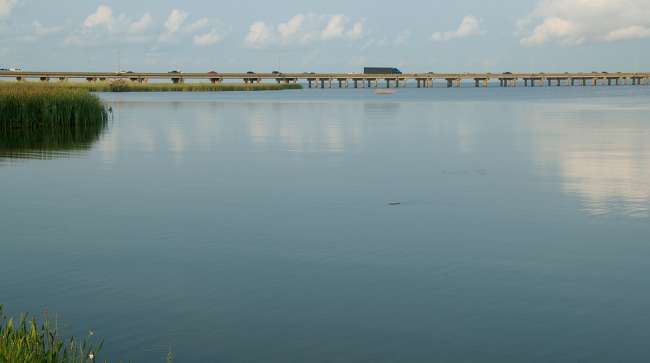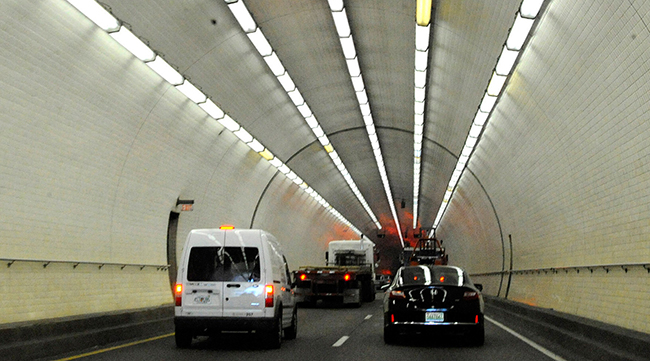Staff Reporter
Alabama Leaders Pitch Trucks-Only Toll Bridge

[Stay on top of transportation news: Get TTNews in your inbox.]
Leaders in the Mobile, Ala., area have proposed plans for a new toll bridge project that will be exclusive to large trucks.
Representatives of government agencies and planning groups gathered March 22 to present their plan meant to reduce congestion. Leaders from the Eastern Shore and Mobile Metropolitan Planning Organizations were among the speakers.
With the current traffic pattern, vehicles cross the Mobile River using the George Wallace Tunnel and the Mobile Bay using a pair of concrete viaducts called the “Bayway.” They carry Interstate 10. The Wallace Tunnel is less than 1 mile long. The Bayway is about 7.5 miles long.

Traffic crawls through the George Wallace Tunnel on Interstate 10 beneath the Mobile River in Mobile, Ala. (Associated Press/Jay Reeves)
The proposed project would involve the construction of a four-lane bridge over the Mobile River dedicated solely to large trucks. All trucks longer than 46 feet would be required to use this bridge and pay a fee. Additionally, the existing Bayway would be restriped and converted from two lanes to three in each direction. No toll would be levied on cars.
Members of the trucking industry expressed opposition to this proposal. American Trucking Associations Vice President of Highway Policy Darrin Roth said everyone who benefits from a project should play a role in helping to pay for it.
“We’re opposed in general to tolls on existing interstates,” Roth told Transport Topics. “We’re even more concerned when the toll is imposed only on trucks. We don’t think that’s fair.”
The proposed projects aim to take large trucks out of the Wallace Tunnel, a move projected to decrease average passenger car delays by about 60-90 minutes during peak times. Overall traffic flow on the Bayway is expected to increase under this proposed project.
John Lynch, senior vice president of federation relations and industry affairs for ATA, said the majority of congestion on this stretch of route comes from holiday weekend travelers rather than truckers.
“The devil’s in the details, and they didn’t provide really any details,” Lynch told TT. “The problem is really a lack of political will to tackle this issue. They’re going to look to try to put it on the interstate trucking industry, but in so doing they’re going to really penalize people around Mobile, especially those who own smaller trucking companies who are going to be stuck taking that bridge on a daily basis.”
Kevin Harrison, director of transportation planning at the South Alabama Regional Planning Commission, said part of the problem with congestion on this route is traffic coming from Florida, Texas and Louisiana. He said weekend traffic has slowed to a crawl this time of year due to spring break visitors. The Mobile Metropolitan Planning Organization is a program of the South Alabama Regional Planning Commission.
“It’s at capacity failure right now,” Harrison told TT. “There’s an incredible need for additional capacity. I imagine an 18-wheeler truck longhauling would rather pay a small toll to get through ultimately about 10 miles instead of crawling through traffic. The cost of trucks sitting in traffic would be a lot greater than the truck-only toll across Mobile Bay and across Mobile River.”
The proposed truck bridge project will need to advance through a series of approvals before it proceeds. Lynch identified the influence of Rhode Island’s trucks-only tolls on this proposed project. ATA has been engaged in a legal battle over Rhode Island’s trucks-only tolling system, which the group has argued discriminates against interstate commerce. The trucks-only tolling system is part of former Gov. Gina Raimondo’s RhodeWorks program.
“The basic premise of truck-only tolls, I think, is born out of what we saw in Rhode Island,” Lynch said. “That’s where the idea kind of really took hold and others, like Alabama, have kind of seized on that and are looking at it as a way to pay for infrastructure and not put a tax on their own people.”
Roth and Lynch said they are anxious to see a more specific analysis regarding traffic reduction figures for this proposed project. Roth said ATA will look at legal avenues if it has to and hopes that “cooler heads will prevail.”
“We’re going to be watching extremely closely and anxiously awaiting to see the details,” Lynch said.
Want more news? Listen to today's daily briefing below or go here for more info:




